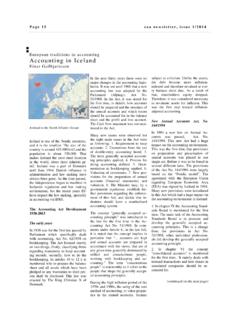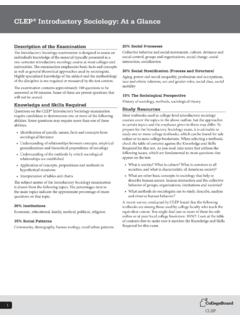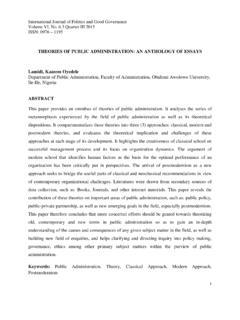Transcription of Accounting in Italy - eaa-online.org
1 Page 15 eaa newsletter, issue 2/2014. European traditions in Accounting Accounting in Italy Cl audi a Ar en a, S ar a S agg es e, F a b ri zi a S ar t o an d R i c c a r d o V i g a n . Accounting theory and practice will be In the XX century, two theories that discussed. Finally, it will be highlight- strongly influenced the Italian account- ed the state of the art of Accounting ing tradition stand out and were based research in Italy . on the thoughts of Fabio Besta and Gino Zappa. In his scientific study of Influence of the Economia Aziendale Accounting Besta stressed the concept on Accounting of the azienda and tried to overcome the wide variation in the activities of The Italian Accounting developed as aziende by focusing narrowly on eco- part of a wider discipline intended to nomic administration.
2 Accounting capture all the economic aspects of a becomes the science of economic con- particular kind of an economic entity - trol at the theoretical level aiming to the azienda. develop the general principles for all Although Italian authors were in the kinds of azienda. vanguard in publishing early textbooks Zappa studied under Besta in Venice on double-entry bookkeeping, distinc- in the early years of the twenty centu- tively Italian theoretical approach ry. He conceived the Economia Azien- emerges only in the XIX century, with dale as a unifying discipline of all particular significant contribution of productive and economic activities for the Lombard School and the business as well as government enti- International scholars are conscious of Tuscan School.
3 Ties. According to Zappa and his schol- the contribution of Italy to the devel- ars, the azienda is regarded as an au- The main representative of Lombard opment of Accounting practice. In fact, tonomous and holistic system, and School was Francesco Villa (1840). the historical origins of Accounting Economia Aziendale is claimed to who viewed Accounting as a part of a were grounded on the bookkeeping possess its own rules. In addition, the wider process of administration. It was and in particular on the method of azienda can be examined in terms of concerned not only with recording double-entry which was first promul- coordinated subsystems . As a conse- economic transaction, but also with gated by the Italian Luca Pacioli. quence, Economia Aziendale is com- overall organizational and administra- Nevertheless, there is less appreciation tive issues pertained to the azienda, posed by three traditional organic seg- of the distinctive Italian position in defined as fundamental unit of eco- ments: organizzazione (organization), Accounting theory.
4 As happened in nomic activity. ragioneria ( Accounting ) and gestione other countries ( Germany), it de- (management and operations). veloped as part of a wider discipline The Tuscan School played several important roles. Its members founded The emergence of the Economia aimed to capture all the economic as- Aziendale as unitary discipline has pects of the azienda: Economia Azien- and revitalized the Accounting journals and associations (Accademia dei lead to a shift in the Accounting tradi- dale. This discipline, mainly attributed tion from a more patrimonialistic to the thought of Gino Zappa and his Ragionieri; national conference of the accountants) and individual scholars approach (patrimonialisti) towards an followers, is concerned with the study income oriented ap- of the azienda's management, account- cast their influence over subsequent theoretical views of Accounting .
5 Fran- proach (redditualisti). ing and organization. Despite its cen- trality for Italian Accounting thought, cesco Marchi (1867), for example The emphasis of the patrimonialistc the relationship between Economia attempted to improve on the approach identified with Besta Aziendale and Accounting (ragioneria) personification views of Accounting (1922), was on capital (as the ultimate is not well understood outside Italy . borrowed from French writers. To- Accounting reality) as reflected in the gether with Giovanni Rossi (1882), he balance sheet. Besta's emphasis was In the following, the evolutionary pro- stressed the juristic nature of account- on the control of the entity's wealth cess of Italian Accounting studies will ing . Giuseppe Cerboni (1886) advo- seen as consisting of positive elements be traced.
6 Starting from the early con- cated a science of economic admin- (assets) and negative elements tributions of the main representative istration of economic units ( (liabilities). Accounting schools, the discussion will aziende) with Accounting seen not only focus on the scholars that strongly as computation but also as having eco- influenced the Italian Accounting theo- nomic and administrative aspects. (continued on the next page). ry. Then, the relationship between Page 16 eaa newsletter, issue 2/2014. Accounting tradition in Italy (cont'd). (continued from the previous page) Italy . of the international developments in Accounting research and practice. In conclusion, in the track laid down Within this patrimonial or There was no formal exchange be- by these two scholars, their disciples proprietorial approach, events repre- tween Italian and American Accounting contributed to the promulgation and sent changes in net worth (Capitale studies.)
7 They simply ignored each development of their ideas, giving Netto): the sum of individual changes other, and developed towards com- energy, through the decades, to the in assets and liabilities over a certain pletely different paths. In Italy , the construction of independent schools of period gives the measure of income. neglected analysis of the market of thought. The most important were: the The balance sheet is the main account information and of the mechanisms Milan School (Onida, Amaduzzi, of the financial statement. The profit that govern the behaviour of actors led D'Ippolito, Dell'Amore, Pivato, and loss account is a mere addition. to a gap between Accounting theory Caprara, Zerbi, Masini, Guatri, Rossi, The patrimonial approach is analytical and practice.
8 Beyond the features of Cudini, Lo Russo and Tancredi Bian- adopting an atomistic view: the azien- Italian setting - the presence of medi- chi), the Tuscan School (Ceccherelli, da is a simple sum of several compo- um-sized family businesses, the access Giannessi, Riparbelli, Ponzanelli and nents, so every items of net worth is to capital and resources that is general- Caramiello), the Genoa School likely an independent atom with indi- ly not correlated with information pro- (Giovannini and Cassandro) and the viduality and a single value. Only cap- vided by financial statements - the Neapolitan School (De Minico and ital is important and income is the delay in the methodological approach Amodeo). Accounting measurement of the change was crucial.
9 In capital over time. Gap between Accounting theory and To appreciate how this delay has con- The income orientated approach practice tributed to the gap between Accounting may be distinguished from the patri- theory and practice, it is important to monial approach. In the former, events The success of Economia Aziendale look at the evolution that the financial occurring in the azienda give rise to may be explained by reference to sev- statement experienced within the Ital- (and measure) positive and negative eral factors: the authority of ragioneria ian setting. changes, as elements of the periodic scholars; the attraction of an autono- formation of income. Because events mous science studying the azienda as Until the 60s the financial statement are conceived as inseparable over the unitary economic realty; and the de- was typically internal oriented and had entire life of the azienda, income (with ductive rationality of many theoretical no other purpose than to try to repro- its costs and revenues) is unitary in assumptions, enriched with the frame- duce the economic reality performed both time and space.
10 Differently from work of a new income-oriented by operations. Hence, most authorita- the patrimonialistic view, the proposed bookkeeping system. However, the tive scholars of Economia Aziendale is a synthetic approach: the azienda is enthusiasm for the new way of think- provided important contributions to considered as a whole. Every item of ing perhaps become excessive, stimu- identify a theoretical model of finan- the net worth loses its individuality lating many to extend the concept of cial statement. The reason for this rela- and value in favour of its whole upon Accounting to become synonym of tively narrow view is mainly related to which it depends. The main focus is on Economia Aziendale. The original the average size and the typical propri- income and capital is a derived con- scientific message was misunderstood: etary structure of the Italian azienda at cept and has not an independent value.










